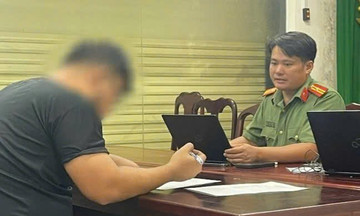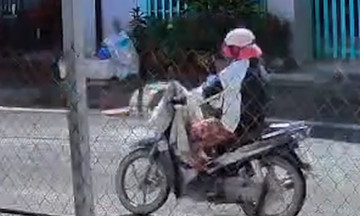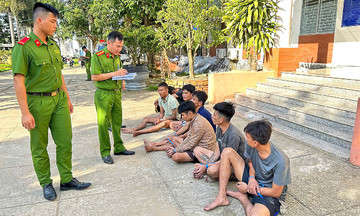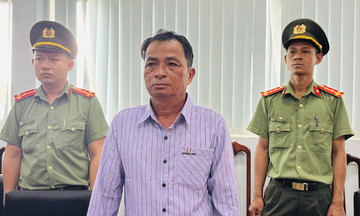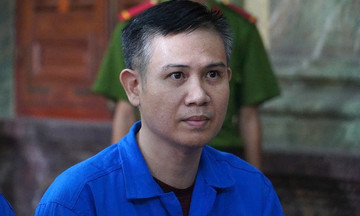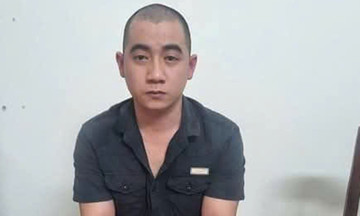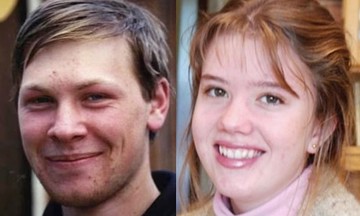On a frigid December morning in 2000, three fishermen discovered a man's body floating near the bank of the Oder River. His hands and feet were bound behind his back, a noose tightened around his neck, contorting his body into a gruesome posture.
Clad only in a sweatshirt and underwear, the victim's body bore the marks of a brutal beating and multiple stab wounds. A pathologist determined the near absence of food in his stomach indicated he had been starved for several days before his murder.
The perfect crime
Initially, police suspected the victim had been strangled and then thrown into the river. However, fluid found in his lungs indicated drowning, suggesting he was likely alive when submerged.
The victim's tall stature, dark hair, and blue eyes matched the description of 35-year-old Dariusz Janiszewski, a businessman from Wroclaw, over 90 km away, reported missing by his wife nearly four weeks earlier. Dariusz was last seen on 13/11, leaving his small advertising agency in central Wroclaw.
When summoned to identify the body, Dariusz's mother instantly recognized his long hair and a birthmark on his chest.
Police launched a large-scale investigation. Divers searched the icy river for evidence, while forensic specialists combed the surrounding woods. Dozens of Dariusz's associates were interrogated, and his business records scrutinized, but nothing of significance surfaced.
Dariusz and his wife had been married for eight years. They had experienced a brief period of marital discord but had reconciled and were in the process of adopting a child. Dariusz had no apparent debts or enemies, nor any criminal record. Witnesses described him as polite and non-confrontational.
After six months, the investigation stalled, unable to identify any suspects. The Polish media dubbed it "the perfect crime."
The missing phone
In the fall of 2003, Jacek Wroblewski, a 38-year-old detective at the Wroclaw Police Department, took over Dariusz's case.
Jacek studied the forensic reports and crime scene photos. The brutality suggested a deeply personal conflict, the stripping of the victim's clothes a deliberate act of humiliation. According to Dariusz's wife, he always carried credit cards, but they hadn't been used since his disappearance—another indication that this was not a simple robbery.
Dariusz's mother, who worked as an accountant at his advertising agency, revealed a crucial detail: on the day of his disappearance, a man called the office around 9:30 a.m., claiming to have an urgent order and requesting a direct meeting with Dariusz. They agreed to meet that afternoon. The building's receptionist saw Dariusz leave the office around 4 p.m., leaving his car behind. She noticed two men seemingly following him but couldn't provide a detailed description.
Phone records revealed the call to the office originated from a payphone down the street, followed by a call to Dariusz's mobile phone.
Jacek deduced the person behind the abduction was organized and cunning, having researched Dariusz's routine and knowing how to lure him out of the office and into a vehicle.
Realizing Dariusz's mobile phone was never recovered, Jacek enlisted the help of a newly recruited telecommunications expert.
While Dariusz's number hadn't been used since his disappearance, mobile phones typically carry a manufacturer's serial number. With information from Dariusz's wife, Jacek quickly discovered a phone with the same serial number had been sold on the online auction site Allegro four days after Dariusz vanished. The seller, using the username ChrisB, was identified as 30-year-old Krystian Bala.
A shocking novel
Krystian had been considered one of the brightest philosophy students at Wroclaw University, attending from 1992 to 1997, but friends described him as having a "rebellious mind."
He married his high school sweetheart, Stasia, in 1995 and had a son two years later. In 1997, he graduated with top marks and enrolled in a doctoral program in philosophy. Despite receiving a full scholarship, Krystian struggled financially and soon dropped out to start a cleaning company.
Lacking business acumen, he filed for bankruptcy in 2000. His marriage also dissolved due to infidelity. Following his divorce, he left Poland, traveling to the US, then to Japan and South Korea, teaching English and scuba diving.
Krystian had been living abroad for three years and was not easily contacted. Checking his background, Jacek discovered he had recently published a novel titled *Amok*, featuring a surreal image of a goat—an ancient symbol of the Devil—on the cover.
The book was violent, sexually explicit, and disturbing. The protagonist and narrator, a bored Polish intellectual, drank heavily and engaged in casual sex when not pondering philosophy.
Jacek was shocked by the novel's depravity. He noted how the narrator murdered a lover for no reason and concealed the act so skillfully he was never caught. Jacek was particularly struck by the killer's method: "I tightened the noose around her neck."
Then, Jacek noticed something else: the killer's name was Chris, the English version of the author's own name. It was also the username Krystian Bala used on the online auction site.
According to Krystian, *Amok* encapsulated all his philosophical obsessions. Completed in late 2002, he crafted Chris's biography to mirror his own, even commenting online under the name Chris in discussions with readers, as if he were the character.
Few bookstores in Poland stocked *Amok*, partly due to its shocking content, selling only a few thousand copies. Online, a handful of critics praised *Amok*, but most readers dismissed it as "having no literary value."
Unraveling the novel for clues
Detective Jacek underlined numerous passages while studying *Amok*. One detail sent chills down his spine: after the murder, Chris stated, "I sold the Japanese knife through an internet auction." The similarity to the sale of Dariusz's mobile phone online—a detail the police had never released—seemed more than coincidence. In another passage in *Amok*, Chris also hinted at having killed a man.
To the surprise of his team, Jacek copied the novel and distributed it, assigning each member a chapter to "interpret," searching for any clues, coded messages, or parallels to reality.
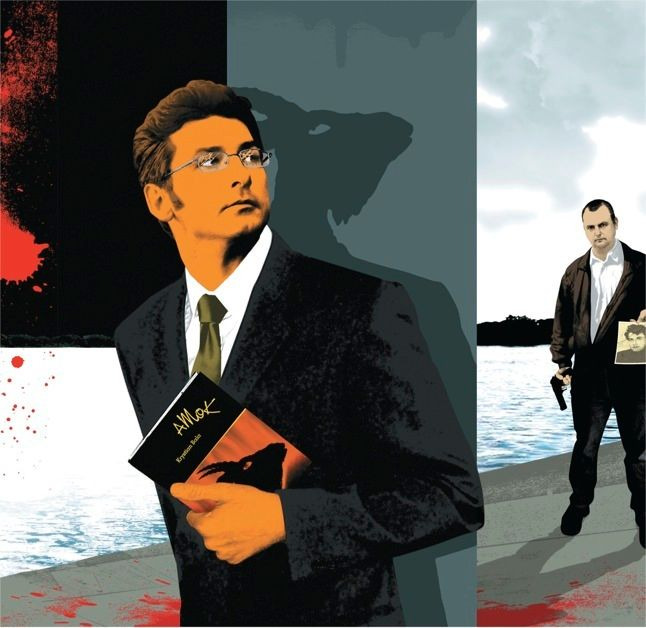 |
Krystian Bala (left) insisted his violent novel was fiction, but detective Jacek Wroblewski was certain it held the key to the murder. Illustration: *New Yorker* |
With Krystian living abroad, Jacek cautioned his colleagues against alerting him. If Krystian didn't voluntarily return to visit his family, Polish police had little power to apprehend him.
Jacek's team reviewed public records and interviewed more of Krystian's associates, building a profile of the suspect, then comparing it to Chris's profile in the novel. Jacek realized both Krystian and Chris were fascinated by philosophy, abandoned by their wives, bankrupt, world travelers, and heavy drinkers.
Police consulted a criminal psychologist to analyze Chris's personality for further insights into Krystian. The psychologist acknowledged the connections between Krystian and Chris but cautioned such overlaps were "common among novelists," and "analyzing an author based on a fictional character was a serious breach."
Checking if Krystian had traded other items online under the username ChrisB, Jacek discovered on 17/10/2000, a month before Dariusz's disappearance, Krystian had accessed Allegro searching for a police manual detailing various ways to tie a noose.
A sensational arrest
On the afternoon of 5/9/2005, shortly after returning to his hometown, Krystian was arrested. In the interrogation room, he denied knowing Dariusz or anything about the 2000 murder.
Pressed about the uncanny details in *Amok*, Krystian admitted drawing some inspiration from his own life, claiming all authors did the same. He said he couldn't recall where he got the mobile phone, suggesting perhaps a pawnshop.
In Poland, after 48 hours of detainment, prosecutors must present evidence before a judge and formally charge a suspect; otherwise, the police are obligated to release them. The case against Krystian lacked concrete evidence, with no motive or confession. Consequently, authorities charged him only with selling stolen property (Dariusz's phone) and a business bribery charge from several years prior. Neither charge carried a significant prison sentence.
Meanwhile, Krystian's case captivated Poland. He filed complaints, alleging police abduction and torture. The Polish Ministry of Justice received letters from around the globe arguing, "One cannot prosecute a person based on a novel they wrote."
Polish authorities launched an internal investigation into Krystian's allegations. In early 2006, after months of inquiry, they declared no credible evidence was found, asserting he had fabricated the claims.
Jealousy and control
With Krystian unable to leave Poland, Jacek's team interviewed close friends and family. A darker picture of Krystian's life began to emerge.
During 1999-2000, as his business and marriage crumbled, Krystian became erratic, often drunk and out of control. A housekeeper recounted him constantly berating Stasia, suspecting her of having multiple affairs.
Even after their separation in 2000, he remained controlling. A friend recalled a New Year's Eve party in 2000, just weeks after Dariusz's body was discovered, where Krystian flew into a rage, believing a bartender was flirting with Stasia. He threatened to "deal with" the bartender, shouting he had "dealt with a guy like that before."
Simultaneously, detectives traced the two calls from the payphone to Dariusz's office and mobile phone, both made using prepaid phone cards. Each card carried a unique number registered with the phone company. Experts identified the caller's card number, tracing 32 calls made over three months, including calls to Krystian's parents, girlfriend, friends, and a business partner. "The truth became increasingly clear," Jacek stated.
Jacek's team uncovered another link between victim and suspect. A friend of Stasia informed police that in the summer of 2000, while at a Wroclaw nightclub, Stasia had conversed with a tall, blue-eyed man with long hair. Later, she realized this man was Dariusz.
Initially, Stasia refused to cooperate with police, fearing her ex-husband. However, when shown passages from *Amok*, she was disturbed by the similarities between Chris's wife and herself and agreed to talk.
Stasia confirmed meeting Dariusz at the nightclub, exchanging numbers, and later meeting for a date at a motel. She left abruptly when Dariusz revealed he was married. They never met again.
Weeks after her encounter with Dariusz, Krystian showed up at Stasia's apartment, drunk and demanding she confess to an affair with Dariusz. He broke down the door, assaulted her, and yelled that he had hired a private investigator and knew everything.
Later, upon learning of Dariusz's disappearance, Stasia asked Krystian if he was involved. He denied it, and she believed him, thinking he couldn't possibly have committed murder after making such a scene.
Jacek recalled the final line of *Amok*: "This is the one killed by blind jealousy."
Two trials and a literary sensation
Krystian briefly confessed to the murder in April 2006 but later refused to sign the statement, claiming he was "unwell" at the time.
On 22/2/2007, the first day of Krystian's trial, spectators packed the Wroclaw courtroom. "Murder doesn't impress much in the 21st century, but allegedly committing murder and then writing about it in a novel is front-page news," noted an article in *Angora*.
Krystian, wearing a suit and glasses, stood in a nine-foot-high, 20-foot-long cage with thick bars, positioned near the center of the courtroom. He faced up to 25 years in prison.
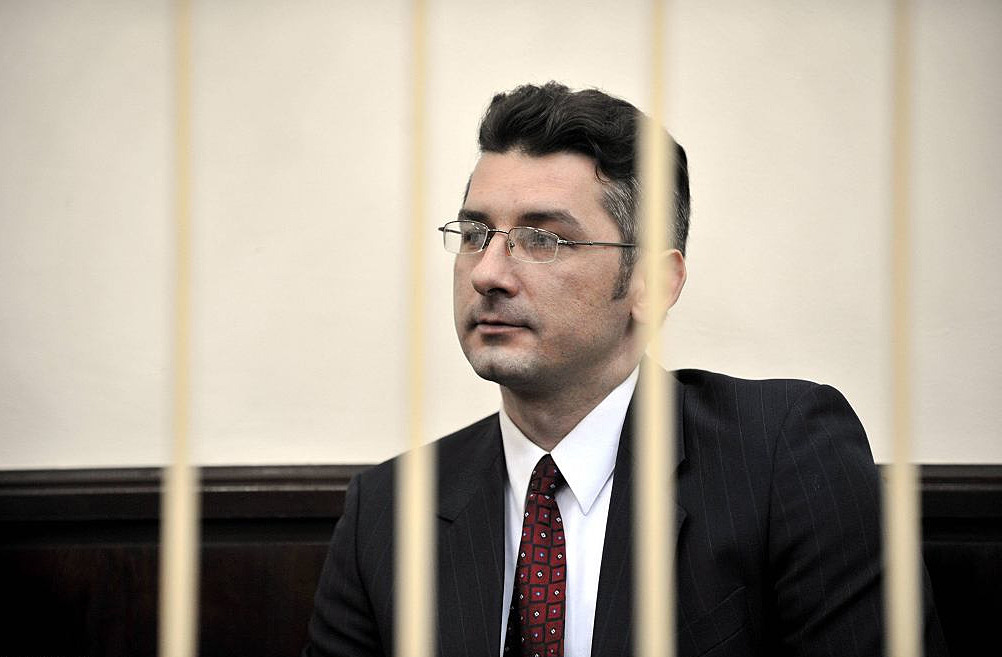 |
Krystian Bala on trial in 2007. Photo: *Wyborcza* |
The prosecution argued Krystian committed the murder in a jealous rage. A psychologist testified that "every author puts a part of their personality into their artistic creation."
Addressing the court, Krystian maintained no one had seen him abduct, kill, or dispose of the victim. He complained the prosecution had taken random events from his personal life and woven them into a narrative far removed from reality.
In early September 2007, the case went to the jury. As the judge read the guilty verdict, Krystian stood motionless. He was sentenced to 25 years in prison.
Since Krystian's arrest, *Amok* became a phenomenon in Poland, selling out in most bookstores. In a post-conviction interview, Krystian boasted excitedly about a new edition featuring an afterword about the trial and subsequent events. Flipping through his book, he added: "Other countries want to publish it too. There's never been a book like this."
Weeks later, to the astonishment of many, the court overturned the initial verdict. While the appeals panel found an "undoubted connection" between Krystian and Dariusz's murder, they concluded gaps remained in the "chain of logical evidence," such as conflicting testimonies from medical examiners, requiring clarification. The judge also questioned Krystian's ability to act alone, given Dariusz's 6'4" muscular build compared to Krystian's slender 5'8" frame.
In December 2008, Krystian was retried, again found guilty, and resumed serving his 25-year sentence.
In 2017, Krystian Bala's *Amok* inspired the film *Amok*, directed by Kasia Adamik.
Tue Anh (*The New Yorker*)



